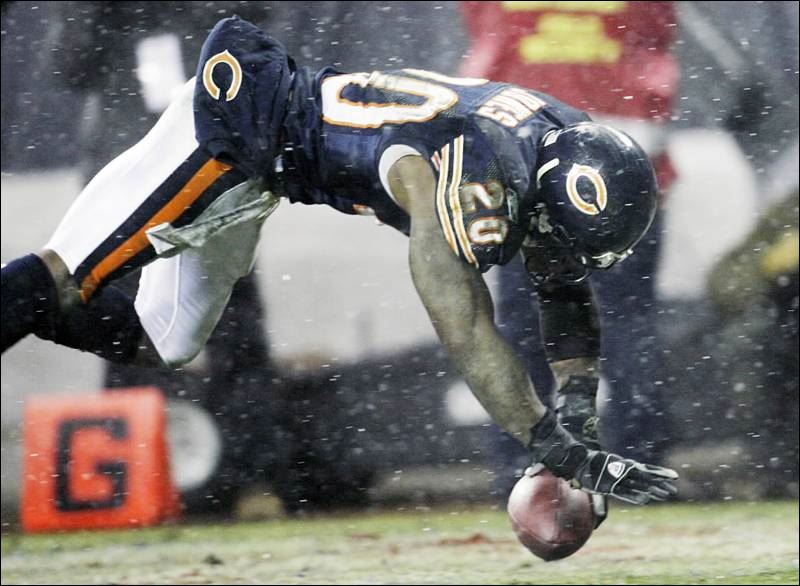
NFL Afterlife: Thomas Jones
NFL Afterlife is a series of conversations with former players about their careers, life without pads, and anything else we want to discuss.
Thomas Jones is just one of those special people who make it seem easy. In a league that inhales running backs and spits them out five seconds later, Jones carved out a consistently stellar, relatively injury-free career that spanned a whopping twelve seasons. Drafted by Arizona in 2000 as the no. 7 overall pick, Jones went on to play for the Bucs, Bears, Chiefs and Jets, finding success everywhere he landed. From 2005-2009, Jones finished with at least 1,100 rushing yards per season, and remarkably, didn’t miss a game in his final six seasons.
Retired since 2012, Jones now goes by the more sophisticated moniker, Thomas Q. Jones, a testament to his new life as an actor, where he’s found almost instant success. He’s landed parts on Shameless, fulfilled many an actor’s dream by playing Gabrielle Union’s love interest in Being Mary Jane and this Sunday will headline the television film, Runaway Island on TV One.
We chatted about both of his careers.
Melissa Jacobs: You are quickly amassing an impressive acting resume. How did the transformation from athlete to actor come about?
Thomas Q. Jones: When I retired I had 8-9 months where I was a confused space. I played football since I was six and then it was over. You can only play for so long. If you’re an artist, you can play forever. You can’t be a lifelong football player. It’s impossible.
Again. I was really in this confused space. I always had ambitions of taking over a music/entertainment company so I went that route. I was landing artists. I was producing music with artists, but I wasn’t the artist. As a football player, I’m the talent. As a manager, you are relying on everyone else’s hard work and dedication to be successful and that just wasn’t something I was used to. I had started to produce a television series in Miami and added films to my company. Then I started working with Clifton Powell, the great actor who’s been in a lot of projects over the years. He encouraged me to act and told me I was a natural.
MJ: What has been the biggest challenge for you so far in the crossover?
TQJ: Having to move to L.A. because I’m from the East Coast. It has its perks, but all my friends are on the East Coast. Sometimes I get a little homesick because everything is different out here. Especially the culture. I was never a fan of L.A. I like my Timberlands. Here, I’m supposed to trade them in for some Chuck Taylors.
From a professional standpoint, everything has been great. I’ve been fortunate to work with some major players early in my career. Because it’s all happened so fast, I’ve had a quick intro into Hollywood as an actor. It can take people years to work next to a Gabrielle Union or Paul Giamatti and I’ve been able to do those things in the first two years of my career. It’s made the transition much easier.
MJ: You’re not the only athlete who wanted to become an entertainer, and many entertainers dream of becoming professional athletes. Do people on the set want to talk football with you?
TQJ: Yes. I never watched much television because to be a successful professional athlete you sometimes have to live in a bubble. For them, a lot of them are sports fans. I didn’t know who many of these people were, but they all knew me on set. With a few exceptions.
It was funny, I shot an episode of Shameless in Chicago and we were outside. Some people were coming by getting my autograph, and the director, who didn’t know I played football, he was asking me, ‘so, who are you?’
MJ: Your latest film, Runaway Island premieres July 25th on TV One. Tell me about your character, Raphael Burrows?
TQJ: He is a former NFL star and he has a relationship with a socialite. Basically my publicist and her publicist set us up together because I guess that’s what celebrities do. We’re together because it’s going to help our brand but we actually end up catching feelings for each other.

MJ: Sounds fun. Onto the NFL. Running backs have an average playing career of 3 years. You played for 12 years – and correct me if I’m wrong – without a major injury?
TQJ: Nothing major, no, but a lot of these minor injures have turned into major things
MJ: What are your lingering issues?
TQJ: I have shortness of breath, trouble breathing. I have numbness in my left pinkie and left ring finger from nerve damage in my elbow. When I wake up in the morning to do anything, my knees and elbows are just cracking. It’s pretty crazy because I actually have some issues remembering things. The great thing about being an actor is that I have to remember lines and that keeps my brain active.
There are a lot of things that people don’t really understand. That’s why I’m working on this documentary called The NFL: The Gift or The Curse? I teamed up with Solaris Entertainment who did the Fab Five documentary. The teaser for our film is online.
MJ: You were well known for your strict workout regiment. How important was that dedication in the gym to your playing career as opposed to just your natural ability?
TQJ: Without my workouts I wouldn’t have been able to play so long. Not just from a physical perspective, but a mental one too. You workout when you’re tired. You workout after practice. These things continue to push you, which is basically what the game is. It all comes down to your mental toughness.
MJ: What’s a typical workout now?
TQJ: It was different when I was playing. I lost about twenty pounds. I played at 225-230, now I’m around 208-210. I don’t want to be too big because it looks awkward on camera.
I don’t lift legs as much because I don’t want to hurt my knees or ankles. And I don’t do much heavy lifting. I play a lot of basketball. I box.
I still lift biceps and triceps on Monday, Wednesday and Thursday. I do chest and back on Thursday and Saturday. I do abs pretty much every day. My diet is just as important. The main thing is I don’t eat any sugar. When we play, we run and do so many physical things but when we retire we don’t run as much because we’re not playing. A lot of guys automatically get out of shape, and I did not want to be one of those guys. I’ve always taken care of my body. I almost feel in better shape now
MJ: What was the best moment of your career?
TQJ: Probably the [2007] NFC Championship. That game, playing in Chicago in the snow, beating the Saints. I had over 100 yards and two touchdowns. I was running around like a little kid with my NFC Championship hat on. It was an amazing experience. I grew up watching Walter Payton play and to be a part of helping Chicago make it to the Super Bowl, yeah, that was the biggest moment.
MJ: The running back position has been devalued in recent years, at least in terms of the draft and fantasy football. Does the current crop of running backs get enough respect?
TQJ: I don’t think so. The league’s become more of a passing league. There are some great running backs in the NFL; unfortunately a lot of running backs are suffering, whether it’s a contract, being able to get carries or the running back by committee thing. The game’s changed.
Honestly, I don’t really watch the NFL that much anymore. I wish the guys the best but as the outside and commercial world becomes more part of the NFL, I think the game will continue to change. I’m not sure if that’s a good thing or not, but it is what it is.

Photo credit: Ian Maddox



